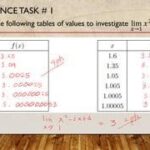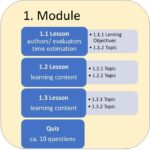At current, at any fee, little or no proof exists that nice mathematicians and calculating prodigies have been endowed with an distinctive neurobiological construction. Like the remainder of us, specialists in arithmetic must wrestle with lengthy calculations and abstruse mathematical ideas. In the event that they succeed, it is just as a result of they commit a substantial time to this subject and ultimately invent well-tuned algorithms and intelligent shortcuts that any of us might study if we tried and which can be rigorously devised to benefit from our mind’s belongings and get get spherical its limits.
Stanislas Dehaene
The Quantity Sense, pages 7-8
Eberhardt Rechtin was a system engineer who helped develop the Deep House Community on the Jet Propulsion Laboratory, served as Director of the Superior Analysis Tasks Company (now DARPA), Assistant Secretary of Protection for Telecommunications, chief engineer for Hewlett-Packard, President and CEO of the Aerospace Company, and eventually a Professor on the College of Southern California earlier than his retirement. In 1995, he gave an interview to Frederik Nebeker of the IEEE Heart for the Historical past of Electrical Engineering on his profession which is offered on-line right here. This can be a far ranging interview protecting a prolonged and distinguished profession. On this interview, he discusses his expertise with a “graduate barrier course” at Caltech (the California Institute of Know-how) whereas getting his Ph.D. in Electrical Engineering (awarded in 1950). This was a extremely mathematical course titled Electromagnetics taught by Professor William R. Smythe. In line with Rechtin’s account, this course was designed to eliminate Ph.D. college students who couldn’t “lower it” at Caltech within the Forties. This text explores what the barrier course could or could not have really been doing.
By his personal account, Rechtin had been a straight A pupil till he took this barrier course. He flunked the course to his shock. Though Caltech allowed college students to retake the course, the scholars who flunked often failed on a second try. At the least in accordance with Rechtin’s account a few years later, the chances had been very a lot towards him. He studied the e-book for the course over the summer time, working by means of downside after downside, apparently with out an excessive amount of success. Then he realized that each downside within the e-book had two methods to work out the reply. One was apparently the usual, brute-force reply which took a very long time, too lengthy for the quick assessments and exams, and was tedious to carry out. This was what he had been doing. However in each case, there was a fast solution to clear up the issue by reusing mathematical options to different issues that had been labored out by mathematicians or engineers beforehand. In his account, he mentions an issue that could possibly be solved rapidly utilizing Bessel features. He knew nothing about Bessel features when he took the course the primary time. There was all the time a “trick” resolution to the issues that concerned reusing identified superior arithmetic. Rechtin took the course a second time and handed simply in accordance with his account.
Rechtin appears to have interpreted the Electromagnetics barrier course as a type of intelligence check wherein the smarter, higher college students by Caltech requirements would determine as he did that the issues had been solvable by reusing numerous identified items of superior arithmetic equivalent to Bessel features. He additionally took it as a lesson for his profession, to all the time search for fast methods to resolve an issue by reusing identified arithmetic or earlier work: don’t reinvent the wheel — definitely good recommendation. However is that really what occurred; was the impact of the barrier course on different college students what Rechtin thought and even what the Caltech professors thought?
The Deliberate Observe Interpretation of the Barrier Course
Deliberate observe is the central idea of Ok. Anders Ericsson‘s idea of knowledgeable efficiency, which has not too long ago been popularized by science author Malcolm Gladwell in his e-book Outliers, beforehand reviewed within the article Debating Deliberate Observe. Deliberate observe is considerably vaguely outlined which is likely one of the main issues with the speculation of knowledgeable efficiency. Ericsson makes use of the instance of the backhand in tennis, which is a comparatively uncommon transfer within the recreation. Tennis gamers who repeatedly observe uncommon strikes such because the backhand will, in common, defeat gamers who don’t interact in particular deliberate observe of the backhand or different uncommon strikes. Somebody who engages in deliberate observe of this kind could effectively defeat gamers with many extra years of expertise enjoying the sport, however comparatively little observe of uncommon strikes. That is type of the idea of deliberate observe. In some contexts, Ericsson makes use of deliberate observe in a extra common solution to consult with a means of steady self-improvement and acutely aware evaluation of 1’s efficiency and errors.
In mental actions equivalent to arithmetic, the notion is that, particularly in a timed contest or examination, if the mathematician encounters an issue that’s too complicated, prolonged, and so forth to resolve from first ideas within the restricted time obtainable, just a few hours for many exams in most school and college programs, the mathematician will fail. However a mathematician who has particularly studied and practiced this particular kind of downside, equivalent to an electromagnetics downside that’s solved with Bessel features, will clear up the issue rapidly and simply. There shall be a dramatic distinction between the 2 on many exams.
Ericsson’s idea emphasizes particular data in a particular discipline or self-discipline. Ericsson largely rejects the notion of genius or common intelligence in addition to an inborn aptitude for a particular topic. There are not any born mathematicians. It’s all research and observe, and a particular type of observe — deliberate observe. Deliberate observe is vital to Ericsson’s idea. There are clearly many examples of mathematicians or chess gamers or musicians who’ve many, a few years of expertise, however don’t carry out on the knowledgeable or “star” degree. Why do some folks with just a few years of expertise, usually ten years, outperform folks with many years of expertise, particularly in mental actions the place bodily growing old is just not as giant an element as in sports activities?
In truth, the barrier course that Rechtin encountered appears like a great instance of deliberate observe. The issues apparently required detailed particular data equivalent to a data of Bessel features. Within the absence of this, the issues took too lengthy to resolve within the restricted time obtainable, just a few hours often. As soon as he found out what was happening, Rechtin in all probability spent many hours finding out Bessel perform and different particular mathematical strategies, though he doesn’t explicitly say this in his interview.
What did the barrier course really do?
It’s removed from clear what the barrier course really did or what it was really presupposed to do. Folks, households, and cultures have completely different beliefs and attitudes towards research and observe. In the US “rote memorization” or “finding out to the check” is usually deprecated and “pondering issues by means of from first ideas” or “pondering for your self” is commonly glorified, no less than in idea. It isn’t distinctive to the US. The creator has heard dad and mom from India, for instance, specific concern that their little one was not being taught to assume issues by means of at school in the US. The widespread stereotype is that Asian cultures equivalent to China and Japan place a robust emphasis on heavy observe. College students from a background that emphasised observe, drilling, and had been already finding out technical minutia like Bessel features would have been more likely to simply go the barrier course. However, college students who had been accustomed to “pondering issues by means of,” and Eberhardt Rechtin sounds very very like this type of pupil in his interview, would are likely to fail. It usually wouldn’t happen to the “assume it by means of” college students to have interaction in deprecated “rote memorization” except somebody instructed them. Rechtin is evident that nobody, neither the opposite graduate college students nor the college, would inform him how you can go the course; he needed to determine it out on his personal or already know what to do.
In his account, Eberhardt Rechtin interpreted the barrier course as an mental puzzle that he found out. That’s, he thought the issue of the course by means of and realized that he wanted to reuse current mathematical data equivalent to Bessel features and this common reasoning perception was the entire level of the barrier course. Perhaps it was. Perhaps it wasn’t. He in all probability interpreted what he skilled from his private and cultural background. The barrier course might simply as simply have had the impact of choosing relatively unimaginative college students whose excessive efficiency was a consequence of heavy drilling and who had poor talents to assume issues by means of. One can think about professors looking forward to unimaginative drones to carry out mental drudge work and never assume issues by means of and ask undesirable or unsettling questions: Professor Millikan, after reviewing your papers, I’m fairly positive your idea that cosmic rays are attributable to nuclear fusion in deep house is all unsuitable for causes X, Y, and Z.
In truth, the impact and the choice of college students might have been fully random. Some college students would have found out the trick instantly with out flunking the course, not like Eberhardt Rechtin. Just a few may need figured it out and handed on the second strive as Rechtin did. Many may need merely glided by means of the course as a result of they had been already working towards or quickly assimilating current specialised data (possibly they may study current data by means of research — studying a textbook about Bessel features, for instance — with little observe or drilling). The barrier course might have chosen a number of various kinds of college students. By his personal account, Rechtin’s expertise was very uncommon; most college students who flunked didn’t go on the second try.
Conclusion
Clearly, one mustn’t draw agency conclusions from a single case, not to mention a verbal account of one thing that occurred over forty-five years earlier than. Nonetheless, Eberhardt Rechtin’s account is just like different choice procedures that the creator has skilled or heard of in graduate applications in mathematical fields equivalent to physics or electrical engineering. These procedures often have the ostensible objective, whether or not acknowledged or not, of choosing the “greatest and brightest” as conventionally outlined. In addition they usually function a ceremony of passage, not maybe not like boot camp within the Marines or hazing in a fraternity, and this can be their true objective and performance.
For college kids, there are some possible classes from this case research. Some assessments and exams will be labored out within the time obtainable from first ideas. This usually appears to be true of math and science issues in elementary, center, and highschool (Ok-12). An emphasis on first ideas and common reasoning strategies will seemingly succeed with these issues, assessments, and exams. Some assessments and exams have trick issues that require particular data realized prematurely of the check like Bessel features in Rechtin’s account. These require particular research and presumably heavy observe to grasp and overcome. These issues seem like extra widespread in additional superior math, science, and engineering programs at faculties or universities. For fogeys and lecturers, it’s seemingly essential to show college students to pay attention to this and to establish the state of affairs to the extent that that is doable.
This case research additionally illustrates the problem and maybe impossibility of distinguishing between particular data and hypothetical common intelligence or particular aptitude (a born mathematician) utilizing assessments and exams. Is there a psychological horsepower and, in that case, what’s it? If there’s a psychological horsepower, is it a single attribute or a number of? Did the barrier course choose “geniuses” who found out the trick as Rechtin did or did it choose mental “drones” who had already memorized the solutions or each? It might be that some exceptionally clever college students had been capable of go the barrier course with out the particular data of Bessel features and different mathematical strategies that Rechtin needed to purchase by means of research and observe. It might be that some college students handed as a consequence of heavy observe of particular strategies equivalent to Bessel features or speedy absorption of current data by means of research (whether or not as a consequence of some innate means to study current data simply or finding out the precise, unusually clear textbook, for instance, enormously decreasing the necessity to observe). The choice of college students who might “lower it” could have been largely random.
© 2011 John F. McGowan
Concerning the Creator
John F. McGowan, Ph.D. solves issues by creating complicated algorithms that embody superior mathematical and logical ideas, together with video compression and speech recognition applied sciences. He has in depth expertise creating software program in C, C++, Visible Primary, Mathematica, MATLAB, and plenty of different programming languages. He’s in all probability greatest identified for his AVI Overview, an Web FAQ (Steadily Requested Questions) on the Microsoft AVI (Audio Video Interleave) file format. He has labored as a contractor at NASA Ames Analysis Heart concerned within the analysis and improvement of picture and video processing algorithms and expertise. He has printed articles on the origin and evolution of life, the exploration of Mars (anticipating the invention of methane on Mars), and low-cost entry to house. He has a Ph.D. in physics from the College of Illinois at Urbana-Champaign and a B.S. in physics from the California Institute of Know-how (Caltech). He will be reached at [email protected].





![Erratum for “An inverse theorem for the Gowers U^s+1[N]-norm”](https://azmath.info/wp-content/uploads/2024/07/2211-erratum-for-an-inverse-theorem-for-the-gowers-us1n-norm-150x150.jpg)

